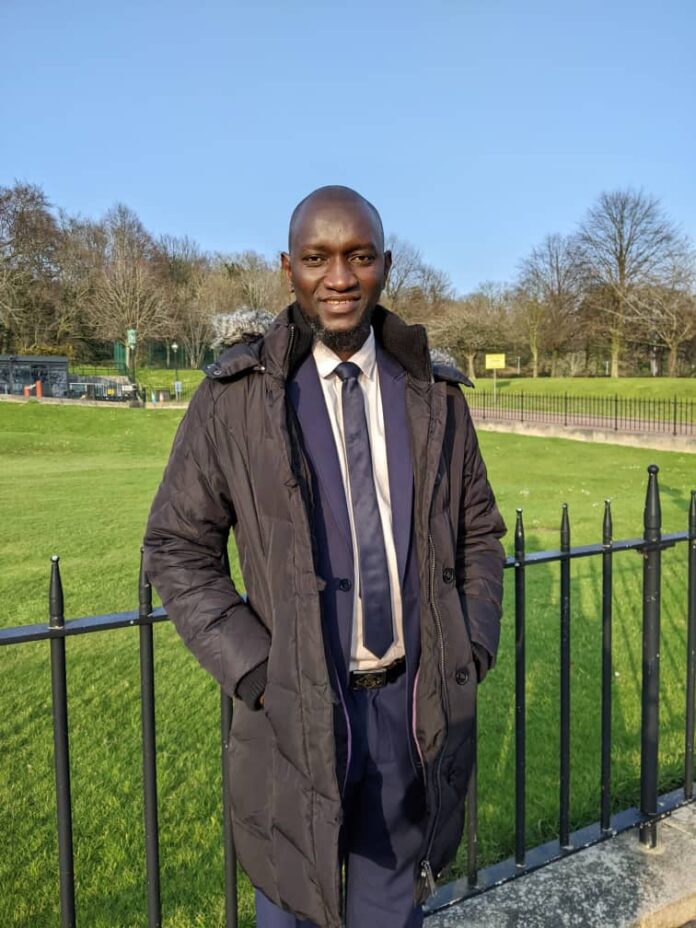By: Alhagie M. Dumbuya, Director of Library and Research, National Assembly of The Gambia
Introduction
Democratic elections are the foundation upon which legitimate governance is built. The credibility of an electoral process depends not only on the procedural fairness of voting mechanisms but also on the overall political environment in which elections take place. In The Gambia, as in many emerging democracies, electoral periods have become highly contentious, often characterized by inflammatory rhetoric and divisive political discourse.
As the country approaches the 2026 presidential elections, political parties have started embarking on their familiar cycle of nationwide engagements—either justifying their actions, defending their records, discrediting their opponents, or providing alternative policies and pathways. As election day draws nearer, the political atmosphere will grow increasingly charged, often giving rise to inflammatory rhetoric and hate speech that threaten national unity, democratic integrity, and peaceful electoral processes. Hate speech, particularly when deployed in the context of elections, represents one of the most insidious threats to electoral integrity. It distorts democratic competition, fuels violence, suppresses political participation, and undermines trust in electoral institutions.
From a linguistic perspective, “hate speech” can be understood as an adjectival phrase that combines a noun (speech) preceded by a modifier (hate) to refer to a specific form or category of messaging or information. The word “speech” on its own would not typically raise any concerns. However, when the generally expected flow of speech is altered or coated with discernible codes of negative emotions, it takes on a more dangerous dimension. The Merriam-Webster online dictionary categorizes hate speech as a noun referring to speech that expresses hatred toward a particular group of people. Similarly, the Cambridge online dictionary defines it as public speech that expresses hate or encourages violence toward a person or group based on characteristics such as race, religion, sex, or sexual orientation.
On a global perspective, the United Nations Strategy and Plan of Action on Hate Speech defines hate speech as “any kind of communication in speech, writing or behaviour, that attacks or uses pejorative or discriminatory language with reference to a person or a group on the basis of who they are, in other words, based on their religion, ethnicity, nationality, race, colour, descent, gender or other identity factor.” According to the Council of Europe, hate speech is understood as all types of expression that incite, promote, spread or justify violence, hatred or discrimination against a person or group of persons, or that denigrates them, by reason of their real or attributed personal characteristics or status such as “race”, colour, language, religion, nationality, national or ethnic origin, age, disability, sex, gender identity and sexual orientation.
In the context of elections, hate speech often takes the form of inflammatory rhetoric aimed at marginalizing or vilifying political opponents or specific social groups. This can include false accusations, incitement to violence, and the spread of harmful stereotypes.
By virtue of the above definitions, it is safe to say that the phenomenon of hate speech has no particular or specific definition in international human rights. This is corroborated by Article 19 which describes hate speech is an “emotive concept [with] no universally accepted definition”. It is a term used to describe broad discourse that is extremely negative and constitutes a threat to social peace.
Given The Gambia’s ethnic diversity and its history of political repression, the use of hate speech by politicians, media outlets, and ordinary citizens on social media should present a concern. It is on the basis of that concern that this paper critically explores the implications of hate speech on electoral integrity, situating the discussion within The Gambia’s political context, examining its effects on voter behaviour, political polarization, and the overall democratic process. It also explores legal, political, and institutional mechanisms that can mitigate the consequences of hate speech, ultimately advocating for a stronger legislative response to protect democratic stability.
Hate Speech as a Threat to Electoral Integrity
Electoral integrity refers to the adherence to democratic principles, legal frameworks, and ethical standards in conducting elections to ensure they are free, fair, transparent, and credible. The concept encompasses the principles of transparency, inclusivity, fairness, and the free expression of political choice. It includes the entire electoral process, from voter registration and campaigning to voting, vote counting, and dispute resolution, all conducted without fraud, manipulation, or undue influence. A high level of electoral integrity ensures that elections reflect the genuine will of the people, uphold political rights, and strengthen public trust in democratic institutions.
The presence of hate speech in an electoral process compromises democratic principles in several ways. It undermines core values such as respect for diversity, equality, and the dignity of individuals, which in turn erodes public trust in the electoral system. First, it distorts democratic competition by shifting the focus from policy-based debates to identity-based hostilities. Rather than engaging in meaningful discussions on governance, candidates resort to vilifying opponents based on ethnicity, religion, or political allegiance. In The Gambia, political discourse has increasingly been tainted with ethnic and religious undertones, with leaders sometimes framing opponents as threats to national identity. Unfortunately, these divisive messages often resonate more with voters than substantive policy issues.
Furthermore, hate speech fosters an environment of intimidation and fear, effectively suppressing voter participation. When certain groups are targeted with inflammatory rhetoric, individuals within those communities may feel unsafe to engage in the electoral process. This was evident in the lead-up to The Gambia’s 2016, as well as 2021 presidential elections, where supporters of different political parties engaged in derogatory and inciting speech, creating an atmosphere of hostility. The suppression of voter participation through intimidation not only distorts electoral outcomes but also weakens the legitimacy of the elected government.
The assertion that unchecked inflammatory rhetoric can erode democratic norms is supported by scholars such as Pippa Norris and the duo Steven Levitsky and Daniel Ziblatt. In her work, Norris (2014) emphasizes the importance of maintaining political legitimacy and adhering to global democratic standards, noting that deviations can undermine the integrity of democratic systems. Similarly, Levitsky and Ziblatt (2018), in their book “How Democracies Die,” discuss how political actors who treat rivals as enemies and intimidate the free press contribute to the weakening of democratic institutions.
In Africa, countries such as Kenya and Côte d’Ivoire have experienced devastating electoral violence triggered by hate speech, where politicians mobilized supporters along ethnic lines, leading to deadly post-election conflicts. In Kenya, the 2007–2008 post-election violence resulted in the deaths of over 1,100 people and the displacement of more than 600,000 others, as ethnic rivalries were exacerbated by inflammatory rhetoric from political leaders. The violence, which erupted after disputed election results, saw supporters of rival parties engage in brutal attacks, with documented cases of targeted killings, sexual violence, and destruction of property (UN Report, 2011).
Similarly, in Côte d’Ivoire, the 2010–2011 post-election crisis led to the deaths of approximately 3,000 people, raping of over 150 women, and displacement of more than one million as political factions, backed by ethnically aligned militias, clashed over election results. Hate speech played a central role in fuelling tensions, with political leaders framing their opponents as existential threats, leading to widespread human rights violations, including massacres and summary executions (UN Report, 2011).
Beyond these two countries, Rwanda’s 1994 genocide serves as the most extreme example of the dangers of hate speech in politics. While not directly tied to an election, radio broadcasts and political propaganda encouraged ethnic hatred, culminating in the mass killing of over 800,000 Tutsis and moderate Hutus in just 100 days. The role of inflammatory speech in instigating violence has since been widely studied as a warning against the unchecked spread of divisive rhetoric (UN Report, 2011).
While The Gambia has not experienced large-scale electoral violence, the country remains at risk given the rising polarization in political discourse. The use of social media to spread ethnic and religious hate speech has grown in recent years, with political figures and their supporters sometimes framing opponents as threats to national identity. If left unchecked, these tensions could escalate into real-world violence, as seen in other African nations where hate speech preceded conflict. Addressing this challenge requires proactive measures, including strict enforcement of laws against incitement, civic education on responsible political discourse, and media accountability to curb the spread of inflammatory rhetoric.
Hate Speech in The Gambia’s Political History
The history of hate speech in The Gambia is deeply intertwined with the nation’s political evolution. During former President Yahya Jammeh’s 22-year authoritarian rule (1994–2016), state-controlled media were systematically utilized to delegitimize political opposition and civil society actors. Jammeh’s regime weaponized hate speech as a tool to consolidate power, suppress dissent, and foster divisions along ethnic and political lines. For instance, in June 2016, at a political rally in Tallinding, Jammeh infamously referred to the Mandinka ethnic group—the largest ethnic group in The Gambia—as “enemies, foreigners” and threatened to kill them one by one, vowing to place them “where even a fly cannot see them” (Human Rights Watch, 2016). This inflammatory rhetoric was not an isolated incident; Jammeh frequently used public platforms to brand political opponents as “traitors” and “enemies of the state,” often targeting specific ethnic groups to stoke fear and loyalty among his supporters.
The impact of this state-sponsored hate speech was profound. It contributed to an atmosphere of fear and repression, where opposition leaders were not only vilified but also faced imprisonment, torture, or forced exile. For example, the 2016 death of Solo Sandeng, an opposition activist who was arrested and killed in custody after leading a protest for electoral reform, underscores the “lethal consequences of Jammeh’s regime and its hate-driven propaganda” (Amnesty International, 2016). The regime’s rhetoric also deepened ethnic divisions, creating a legacy of mistrust and polarization that persists to this day.
Following the democratic transition in 2016, which saw the election of President Adama Barrow, there was widespread hope that political rhetoric would become more inclusive and respectful. However, the newfound political freedom has, in some cases, exacerbated hate speech, particularly on social media. The proliferation of digital platforms has provided a new arena for political actors and their supporters to spread misinformation, inflammatory language, and ethnic slurs, often without accountability. A 2021 report by the Paradigm Initiative confirmed that much of the hate speech in The Gambia, which is usually ethnic or political in nature, occurs on social media platforms like Meta (Facebook) and WhatsApp. The report highlighted how political supporters use these platforms to target opponents with derogatory language, false accusations, and incitements to violence, often under the cloak of anonymity.
A 2023 media monitoring report by Malagen further underscored the prevalence of hate speech on social media, noting that political supporters frequently use these platforms to disseminate inflammatory content. For instance, during the 2021 presidential election campaign, social media was rife with posts targeting specific ethnic groups and opposition figures. Supporters of the ruling National People’s Party (NPP) and the opposition United Democratic Party (UDP) engaged in online vitriol, with some posts inciting violence against perceived political or ethnic adversaries (International Republican Institute, 2021). This shift from state-sponsored hate speech to decentralized, mass-driven discourse presents new challenges for regulating harmful content and ensuring accountability.
Legal and Institutional Response to Hate Speech
Internationally, the legal and institutional response to hate speech has gained prominence due to its potential to undermine democratic processes and fuel social division. The African Charter on Democracy, Elections, and Governance (ACDEG) underscores the responsibility of member states to prevent incitement to violence and discrimination, particularly during electoral processes, as a means of safeguarding democracy and human rights (African Union, 2007). The United Nations Special Rapporteur on the Promotion and Protection of Freedom of Opinion and Expression has also highlighted the dangers of weaponizing speech to erode democratic governance, warning that unchecked hate speech can contribute to polarization, political instability, and even mass atrocities (UN Human Rights Council, 2017).
Empirical studies, such as those conducted by the United States Holocaust Memorial Museum and the Global Network Against Hate Speech, have documented instances where inflammatory rhetoric has preceded violence, as seen in the Rwandan genocide and ethnic conflicts in the Balkans (USHMM, 2014; Global Network Against Hate Speech, 2020). These cases illustrate the urgent need for strong legal mechanisms to counteract the spread of hate speech, particularly in politically charged environments.
In The Gambia, however, the existing legal framework addressing hate speech remains inadequate, leaving gaps that can be exploited for political or sectarian purposes. The Criminal Code includes provisions criminalizing incitement to violence, yet there is no specific legislation that comprehensively defines and criminalizes hate speech within the electoral context. This limitation has led to inconsistent legal enforcement, especially during election cycles when inflammatory rhetoric is most prevalent. The Independent Electoral Commission (IEC) possesses regulatory mechanisms to oversee campaign rhetoric, but enforcement has been inconsistent, largely due to political considerations and institutional weaknesses (International IDEA, 2021).
Similarly, the country’s media regulatory framework, particularly the Information and Communications Act, lacks explicit provisions on hate speech in digital spaces, thereby allowing unregulated online discourse to flourish (Gambia Information and Communications Act, 2009). This regulatory gap is particularly concerning given the rise of social media as a primary avenue for political engagement, where misinformation and divisive rhetoric spread rapidly. A 2022 study by the Center for Democracy and Development (CDD) in West Africa highlighted the increasing use of digital platforms to propagate hate speech in the region, often exacerbating ethnic and political tensions (CDD, 2022).
Comparative legal models from other African nations provide valuable insights into potential solutions for The Gambia. In Kenya, the National Cohesion and Integration Act criminalizes hate speech and includes provisions allowing for the electoral disqualification of candidates found guilty of inflammatory rhetoric (Kenya National Cohesion and Integration Act, 2008). This legislation has played a role in mitigating ethnic and political tensions, particularly during Kenya’s highly contested elections. South Africa’s Promotion of Equality and Prevention of Unfair Discrimination Act (PEPUDA) similarly enforces strict provisions against hate speech in political contexts, offering a legal framework that balances free speech with the need to prevent harmful rhetoric (South Africa PEPUDA, 2000). Both countries provide compelling examples of how targeted legislative reforms can serve as effective safeguards against the dangers of hate speech in fragile democracies.
For The Gambia, adopting a similar approach—through explicit legal definitions, stricter enforcement mechanisms, and institutional capacity-building—could significantly strengthen its democratic resilience. Moreover, integrating digital media regulations into existing legal frameworks would be crucial in addressing the evolving nature of hate speech in online spaces. Empirical evidence from countries that have implemented such measures suggests that proactive legal intervention, combined with public awareness campaigns and independent regulatory bodies, can effectively mitigate the spread of divisive rhetoric and enhance social cohesion (UNESCO, 2021).
The Role of Parliament in Addressing Electoral Hate Speech
The National Assembly has a crucial role to play in combating hate speech through legislative reforms, oversight of electoral institutions, and civic education. Implementing a multifaceted approach can help balance the protection of free expression with the need to prevent harmful rhetorics during elections. One of the most immediate steps the National Assembly can take is the introduction of a Hate Speech Prevention Bill that would clearly define hate speech, establish penalties for violators, and provide enforcement mechanisms. Alternatively, it can also include strong provisions in the Elections Bill that is currently being considered by the relevant committees. This legislation should mandate that political parties adhere to a code of conduct explicitly prohibiting hate speech during campaigns. The International Foundation for Electoral Systems (IFES) emphasizes that clear legal frameworks are essential in countering hate speech during elections, making such a bill a necessary measure (IFES, 2020).
Beyond enacting legislation, the National Assembly can play a crucial role in advocating for and strengthening the Independent Electoral Commission (IEC) to effectively monitor and sanction candidates who engage in inflammatory rhetoric. Granting the IEC the authority to disqualify repeat offenders of hate speech regulations could serve as a powerful deterrent. However, concerns may arise that such powers to the IEC could be weaponized against opposition candidates, especially in contexts where electoral bodies, particularly in Africa, are perceived to be under government influence. While this concern is valid, it remains the responsibility of National Assembly to uphold the IEC’s independence, ensuring it has both the mandate and the institutional capacity to act impartially and resist external pressures.
The Council of Europe’s toolkit on combating hate speech during elections highlights the importance of equipping electoral management bodies with the authority to enforce such regulations effectively (Council of Europe, 2019). In addition, Parliament should collaborate with civil society organizations to promote civic education programs that counter hate speech narratives and encourage issue-based political discourse. The United Nations underscores the role of education in fostering inclusive societies and reducing the spread of hate speech, making civic education an essential tool for electoral integrity (United Nations, 2019).
In the digital era, social media regulation is another pressing concern. While freedom of expression must be protected, the government should work with tech companies such as Meta (Facebook), Twitter, and WhatsApp to establish monitoring mechanisms for hate speech. Many democracies have adopted proactive strategies; for example, Germany’s Network Enforcement Act (NetzDG) requires social media platforms to remove hate speech within 24 hours of reporting (German Ministry of Justice, 2017). The Gambia could follow suit by engaging in regional cooperation with the Economic Community of West African States (ECOWAS) to develop digital governance frameworks that address online hate speech. By implementing these strategies, The National Assembly can play a significant role in safeguarding electoral integrity and fostering a democratic culture free from hate speech.
Conclusion
It is to be acknowledged that hate speech is a potent threat to electoral integrity anywhere, The Gambia being no exception. By distorting political competition, suppressing voter participation, and inciting violence, inflammatory rhetoric undermines the fundamental principles of democracy. While The Gambia has made significant strides in democratic consolidation, the rise of unregulated political discourse poses new challenges that must be addressed through legislative action and institutional reform.
The National Assembly must take a leading role in ensuring that electoral processes are protected from the corrosive effects of hate speech. Strengthening legal frameworks, enhancing institutional oversight, and fostering a culture of political tolerance will be essential in safeguarding The Gambia’s democracy. As the country prepares for future elections, the urgency of addressing hate speech cannot be overstated. The long-term stability of the nation depends on the integrity of its democratic processes, and that integrity begins with responsible political discourse.
REFERENCES
- United Nations. What is hate speech? https://www.un.org/en/hate-speech/understanding-hate-speech/what-is-hate-speech
- The Council of Europe. Hate Speech. https://www.coe.int/en/web/freedom-expression/hate-speech
- ‘Hate speech’ explained: A summary. https://www.article19.org/resources/hate-speech-explained-a-summary/
- Hate speech. Merriam Webster Dictionary. https://www.merriam-webster.com/dictionary/hate%20speech
- Hate speech. Cambridge Dictionary. https://dictionary.cambridge.org/dictionary/english/hate-speech
- Steven Levitsky and Daniel Ziblatt (2018). How Democracies Die. https://newuniversityinexileconsortium.org/wp-content/uploads/2022/08/Levitskyl-Ziblatt-How-Democracies-Die-2018-1.pdf?utm_source=chatgpt.com
- Pipa Norris. (2014). Why Electoral Integrity Matters. https://journals.library.ualberta.ca/cjs/index.php/CJS/article/view/25490/18897?utm_source=chatgpt.com
- “They Killed Them Like It Was Nothing” (Oct. 2011). https://www.hrw.org/report/2011/10/05/they-killed-them-it-was-nothing/need-justice-cote-divoires-post-election-crimes?utm_source=chatgpt.com
- 2007 Kenyan general election. https://en.wikipedia.org/wiki/2007_Kenyan_general_election?utm_source=chatgpt.com
- Statement by the UN Special Adviser on the Prevention of Genocide on recent inflammatory rhetoric by President Yahya Jammeh of the Gambia, targeting the Mandinka ethnic group, June 2016. https://www.globalr2p.org/resources/statement-by-the-un-special-adviser-on-the-prevention-of-genocide-on-recent-inflammatory-rhetoric-by-president-yahya-jammeh-of-the-gambia-targeting-the-mandinka-ethnic-group-june-2016/?utm_source=chatgpt.com
- THE GAMBIA DIGITAL RIGHTS AND INCLUSION 2021 REPORT. https://paradigmhq.org/wp-content/uploads/2022/06/Londa-Gambia-Report-2021-lr.pdf?utm_source=chatgpt.com
- Media Monitoring Report on Hate Speech. 18 June 2023. https://malagen.org/wp-content/uploads/2023/09/MALAGEN-HATE-SPEECH-REPORT-1.pdf?utm_source=chatgpt.com
- Digitalisation and democracy: Is Africa’s governance charter fit for the digital era? https://ecdpm.org/work/digitalisation-and-democracy-africas-governance-charter-fit-digital-era
- Report of the Special Rapporteur on the promotion and protection of the right to freedom of opinion and expression, Irene Khan (A/79/319). https://www.un.org/unispal/document/report-special-rapporteur-23aug24/
- The 2007 African Charter on Democracy, Elections and Governance: Trying to Make Sense of the Late Ratification of the African Charter and Non-Implementation of Its Compliance Mechanism. https://journals.sagepub.com/doi/10.1177/0002039719890185
- UNGA 74 | Failure to define the phrase ‘hate speech’ is silencing human rights defenders. https://ishr.ch/latest-updates/unga-74-failure-define-phrase-hate-speech-silencing-human-rights-defenders/
- Countering Hate Speech in Elections: Strategies for Electoral Management Bodies. https://aceproject.org/today/feature-articles/countering-hate-speech-in-elections-strategies-for?utm_source=chatgpt.com
- Toolkit on combating hate speech during electoral processes 2022. https://rm.coe.int/toolkit-on-hate-speech-during-electoral-processes-2022-/1680aa0bfa?utm_source=chatgpt.com
- Hate speech versus freedom of speech. https://www.un.org/en/hate-speech/understanding-hate-speech/hate-speech-versus-freedom-of-speech?utm_source=chatgpt.com
- Hate Speech on Social Media: Global Comparisons. https://www.cfr.org/backgrounder/hate-speech-social-media-global-comparisons?utm_source=chatgpt.com






